unit5语法(单元5语法).doc
Unit5语法知识点写作背默(默写版)
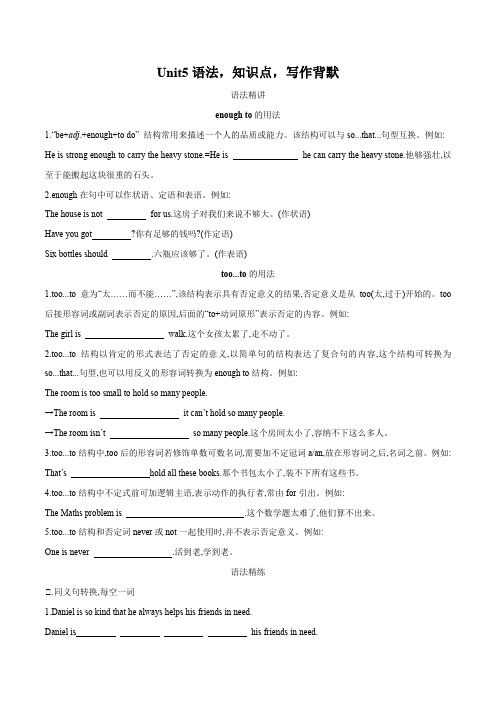
Unit5语法,知识点,写作背默语法精讲enough to的用法1.“be+adj.+enough+to do” 结构常用来描述一个人的品质或能力。
该结构可以与so...that...句型互换。
例如: He is strong enough to carry the heavy stone.=He is he can carry the heavy stone.他够强壮,以至于能搬起这块很重的石头。
2.enough在句中可以作状语、定语和表语。
例如:The house is not for us.这房子对我们来说不够大。
(作状语)Have you got ?你有足够的钱吗?(作定语)Six bottles should .六瓶应该够了。
(作表语)too...to的用法1.too...to意为“太……而不能……”,该结构表示具有否定意义的结果,否定意义是从too(太,过于)开始的。
too 后接形容词或副词表示否定的原因,后面的“to+动词原形”表示否定的内容。
例如:The girl is walk.这个女孩太累了,走不动了。
2.too...to结构以肯定的形式表达了否定的意义,以简单句的结构表达了复合句的内容,这个结构可转换为so...that...句型,也可以用反义的形容词转换为enough to结构。
例如:The room is too small to hold so many people.→The room is it can’t hold so many people.→The room isn’t so many people.这个房间太小了,容纳不下这么多人。
3.too...to结构中,too后的形容词若修饰单数可数名词,需要加不定冠词a/an,放在形容词之后,名词之前。
例如: That’s hold all these books.那个书包太小了,装不下所有这些书。
4.too...to结构中不定式前可加逻辑主语,表示动作的执行者,常由for引出。
unit5语法知识点

Unit5 语法知识点1. 介绍在本文档中,我们将讨论Unit5的语法知识点。
语法是语言的基础,掌握好语法知识可以帮助我们更准确地表达自己的意思。
以下是本文档的主要内容:1.句子成分2.主谓一致3.时态4.定语从句5.虚拟语气2. 句子成分句子是由不同的成分组成的。
主要的句子成分包括主语、谓语、宾语、表语和状语。
主语是句子的主要主体,谓语是主语所表达的动作或状态,宾语是动作的承受者,表语描述主语的特征,状语修饰动作或状态。
3. 主谓一致主谓一致是指主语和谓语在人称和数上保持一致。
当主语是第三人称单数时,谓语动词要加上-s或者-es。
例如,“He runs fast.” (他跑得很快)。
4. 时态时态是指动作发生的时间。
常用的时态有一般现在时、一般过去时和一般将来时。
一般现在时用于描述经常发生的事实、习惯或普遍真理。
一般过去时用于描述已经发生的事情。
一般将来时用于表达将来要发生的动作。
5. 定语从句定语从句是指用来修饰名词或代词的从句。
定语从句通常由关系代词引导,如who、which、that等。
通过定语从句,我们可以进一步描述或限定名词的含义。
6. 虚拟语气虚拟语气用来表达与事实相反的假设、愿望或建议等。
常见的虚拟语气包括虚拟条件句和虚拟表达句。
虚拟条件句用于表达与事实相反的假设,常用if引导。
虚拟表达句用于表达愿望或建议,常用动词原形。
7. 总结在本文档中,我们介绍了Unit5的语法知识点。
通过学习句子成分、主谓一致、时态、定语从句和虚拟语气,我们可以更好地理解和运用英语语法。
希望本文对您的学习有所帮助。
感谢阅读本文档!-End-。
人教版初二(下)英语:unit 5语法篇(教师版)
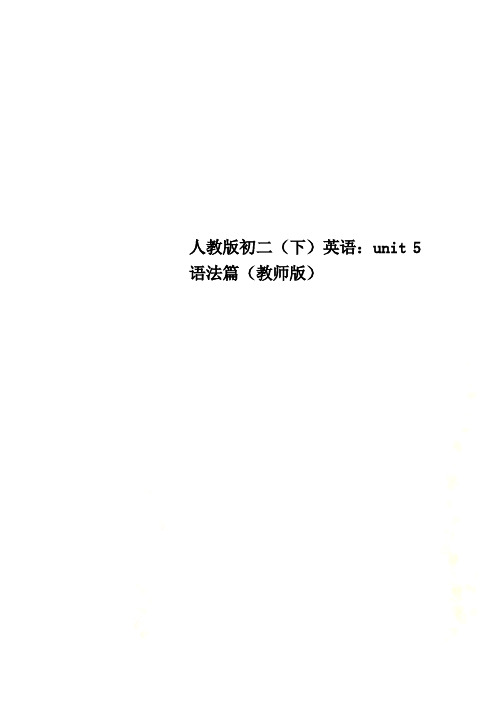
人教版初二(下)英语:unit 5语法篇(教师版)Unit 5 语法篇____________________________________________ __________________________________________________________________________________ ______________________________________学生通过本讲学习,能够掌握本单元的重点语法,并在综合能力上有一定的拓展。
when while 的区别和用法一、while的意思是“在……同时(at the same time that )”“在……期间(for as long as, during the time that)”。
从while的本身词义来看,它只能表示一段时间,不能表示具体的时间点。
在时间上可以是“线线重合”或“点线重合”,但不能表示“点点重合”。
例如:1、He was watching TV while she was cooking. 她做饭时,他在看电视。
(线线重合)2、He was waiting for me while I was working. 我工作的时候,他正等着我。
(线线重合)3、He asked me a question while I was speaking. 我在讲话时,他问了我一个问题。
(点线重合)二、when的意思是“当……时候(at the time that)”“无论什么时候(whenever)” “一……就……期间”时,其谓语通常只能是那些含有动作(action)和发展(development)意味的动词,一般不能是那些不用于进行时态的动词(如be,seem,love,want,agree,see,know,have等),所以下面一句中的while 不能换为as:A:I’m going to the post office. 我要去邮局。
人教版七上unit5语法重点

人教版七上unit5语法重点人教版七上Unit 5语法重点Unit 5是人教版七年级上册的一个重要单元,主要讲述了一些日常生活中常用的动词和动词短语。
在这个单元中,我们学习了一些重要的语法知识,下面就来总结一下这些重点内容。
首先,我们学习了一般现在时的用法。
一般现在时表示经常性或习惯性的动作,或者客观事实。
在句子中,一般现在时的谓语动词要用原形。
例如:I go to school by bus every day.(我每天坐公交车去学校。
)其次,我们学习了一般现在时的否定句和疑问句的构成。
在一般现在时的否定句中,我们需要在助动词do后面加not,然后再加上谓语动词的原形。
例如:I do not like playing basketball.(我不喜欢打篮球。
)在一般现在时的疑问句中,我们需要将助动词do提到句首,并且将主语和谓语动词的位置互换。
例如:Do you like playing basketball?(你喜欢打篮球吗?)接下来,我们学习了一些表示频率的副词,如always(总是)、usually(通常)、often(经常)、sometimes(有时候)、rarely(很少)、never(从不)等。
这些副词可以用来修饰谓语动词,表示动作发生的频率。
例如:I always get up early.(我总是早起。
)然后,我们学习了一些表示喜好和不喜好的动词和动词短语,如like(喜欢)、love(爱)、enjoy(喜欢)、hate(讨厌)、dislike(不喜欢)等。
这些动词和动词短语可以用来表达个人的喜好和不喜好。
例如:She likes playing the piano.(她喜欢弹钢琴。
)最后,我们学习了一些表示能力和兴趣的动词和动词短语,如can (能够)、be good at(擅长)、be interested in(对...感兴趣)等。
这些动词和动词短语可以用来描述一个人的能力和兴趣。
初一下册英语第五单元讲义unit 5 语法篇

Unit 5 语法篇特殊疑问句一、特殊疑问句概述特殊疑问句(special questions),也可称为“wh”-questions,因为它们多数都以who,where,when,which,whose,why这类词开头,如:Who is it on the phone?谁来的电话?How many oranges can you see in the picture?你能在图画上看到多少个橘子?Where did you last see it?你最后一次看到这东西时是在什么地方呢?What did you eat yesterday?你昨天吃了些什么?How do you usually go to school?你通常是怎么去学校的呢?二、特殊疑问句的构成及用法(1)它的结构一般为:特殊疑问词+一般疑问句,即:特殊疑问词+be/助动词/情态动词+主语+谓语/表语+(其他),如:What can be done about it?对此能做些什么呢?Which are yours?哪些是你的?Who would like to come for a game of football?谁愿意来踢场足球呀?What did you say?你说什么?Why didn’t you tell me?你为什么没有告诉我?(2) 特殊疑问句有时可有一个以上的疑问词,如:When and where did you meet?你们何时在何地相遇的?(3)特殊疑问句有时须以介词开首,如:By whom is the book written?此书是谁写的?Since when have you lived here?你从什么时候起住在这里的?(4) 疑问词作主语或主语的定语时,与陈述句的语序相同,如:Who is in the room?谁在房间里?(5)“why+一般疑问句否定式”这种结构一般表示劲告、建议、责备等,而不能归为特殊问句,如:Why don’t you come earlier?你为什么不早些来呢?Why not go skiing?为何不去滑雪呢?三、特殊疑问词特殊疑问词可分为两类:疑问代词和疑问副词(1)疑问代词疑问代词主要有五个,分别为:who,whom,which,what,whose。
冀教版英语七年级上册_Unit5_单元语法聚焦

单元语法聚焦五
(3)现在进行时除表示现在外,还可以表示将来。现在进行时表示将 来时,常有“意图”、“安排”或“打算”的含义。现在进行时常 表示最近或较近的将来,所用动词多是位移动词,如: go, come, leave, start等。 I'm coming.我就来。 When are you starting? 你什么时候动身? Where are we going first? 我们先去哪儿?
单元语法聚焦五
二、方位介词(短语)
教材典句
1. The picture is above the bed. 图画在床的上方。 2. The chair is in front of the desk.椅子在课桌的前面。 3. The ball is under the chair. 球在椅子下面。
单元语法聚焦五
5.动词的现在分词由“动词原形+ing”构成,规则如下表:
词尾变化 一般情况直接加ing
举例 look→looking try→trying watch→watching
以不发音的字母e结尾的词,write→writing dance→dancing
去e,再加ing
make→making
记忆口诀 方位介词(短语)的用法 里面、上面in和on, over, under上、下方; in front of 前,behind后,at是在某点上; 来自from,朝前to,里面穿过是through; 表面穿过across,到上面onto进into; 在旁边beside,在附近near; 唱歌难也易,课后还需认真记。
单元语法聚焦五
3. under意为“在……下面”,指某一物体在另一物体的正下方。 A ball is under the chair. 球在椅子下面。 4. beside意为“在……旁边”。 Mary's sitting beside me. 玛丽正坐在我的旁边。 5. in front of意为“在……前面”,指在物体外部的前面。 There is a big tree in front of our classroom. 在我们教室前面有一棵大树。
人教版九年级英语unit5语法知识点
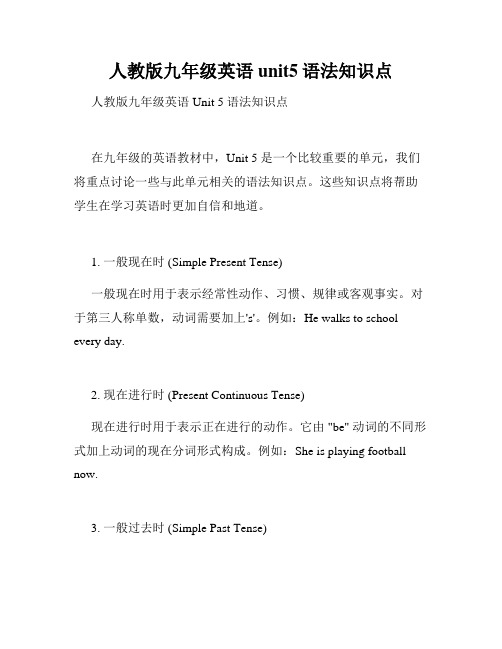
人教版九年级英语unit5语法知识点人教版九年级英语Unit 5 语法知识点在九年级的英语教材中,Unit 5 是一个比较重要的单元,我们将重点讨论一些与此单元相关的语法知识点。
这些知识点将帮助学生在学习英语时更加自信和地道。
1. 一般现在时 (Simple Present Tense)一般现在时用于表示经常性动作、习惯、规律或客观事实。
对于第三人称单数,动词需要加上's'。
例如:He walks to school every day.2. 现在进行时 (Present Continuous Tense)现在进行时用于表示正在进行的动作。
它由 "be" 动词的不同形式加上动词的现在分词形式构成。
例如:She is playing football now.3. 一般过去时 (Simple Past Tense)一般过去时用于表示过去某个特定的时间发生的动作或状态。
动词需要用过去式。
例如:I watched a movie last night.4. 过去进行时 (Past Continuous Tense)过去进行时表示过去某一时刻正在进行的动作或状态。
它由"was/were" 动词的不同形式加上动词的现在分词形式构成。
例如:They were studying when I called.5. 一般将来时 (Simple Future Tense)一般将来时用于表示将来某个时间将要发生的动作或状态。
通常使用 "will" 或 "be going to" 加上动词原形来构成。
例如:Wewill have a meeting next week.6. 现在完成时 (Present Perfect Tense)现在完成时用于表示过去某个时间开始并一直延续到现在的动作或状态。
它由"have/has" 加上动词的过去分词形式构成。
Unit5-First-aid-Grammar省略句语法
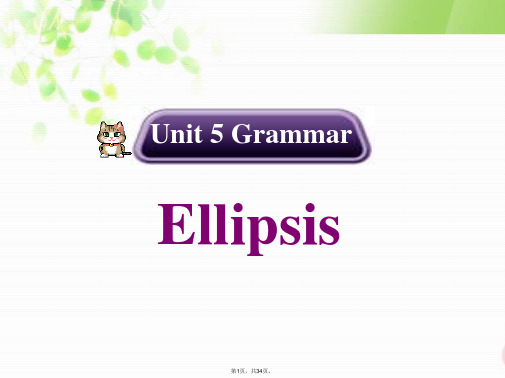
其他省略
1. 连词的that省略 (1)宾语从句中常省略that, 但多个宾语 从句并列时, 通常只省略第一个that
He said (that) the text was very important and that we should learn it by heart.
第18页,共34页。
If I had had time, I would have run round that lake again. Had I had time, I would have run round that lake again. If there should be a flood, what should we do?
带to。 The boy did nothing but play.
第15页,共34页。
(4) 某些使役动词(let, make, have)及感 官动词(see, watch, hear, notice, observe, feel, look at, listen to等)后面作宾语补足
语的不定式一定要省去 to, 但在被动语态中 须将to 复原。
(5) 主语从句中有动词do,后面作表语的不 定式的 to可带可不带。 What we can do now is (to) wait. (6) find 当“发现”讲时,后面作宾语补 足语的不定式符号to可带可不带。 We found him (to) work very hard at the experiment.
I told him to sit down and wait for a moment. (2) help 当“帮助”讲时,后面的宾语或宾
补的不定式符号to可带可不带。
人教版高中英语必修四高一英语unit5语法课件

• Task III合作探究 • I. 从方框中选择适当的单词填空使其构成一个新的单词(每个
单词只能用一次) • market, owned, ever, writing, known, looking, room, head, home,
高中英语课件
(madeofdingshangtuwen)
Book 4, Unit 5 Theme Parks语法 构词法Word-
formation
I.Change the following words into adj.by adding –able. Then complete the sentences using the correct words .
• 5.A. The player injured his shoulder during the game.
• 名词;肩膀
• B. The girl shouldered the basket of fruits. • 动词;扛;负担
• III. 根据句意用括号中所给词汇的适当 形式填空。
• 1. Many accidents are caused by some drivers’ _ca_r_e_l_e_ss_n_e_s_s_(careless).
• 15. The days on the moon get hotter than _____b_o_i_lin__g______(boil) water.
• 16. The mother didn’t know why her daughter was crying ____n_o_is_i_ly_______(noise).
最新人教版八年级英语上册Unit5重点句子结构加语法小结

最新人教版八年级英语上册Unit5重点句子结构加语法小结本文档将为您提供最新人教版八年级英语上册Unit 5的重点句子结构和语法概述。
该单元主要涉及以下内容:典型句式、基础语法知识和常见错误。
让我们深入了解吧!一、典型句式1. 主语 + 动词 + 宾语例如:- My father bought me a new bike.(我的父亲给我买了一辆新自行车。
)- They often go to the park on weekends.(他们周末经常去公园。
)2. 主语 + 动词 + 宾语 + 间接宾语例如:- She gave her friend a birthday present.(她给她的朋友一份生日礼物。
)- The teacher showed the students a new way to solve the math problem.(老师给学生展示了一种解决数学问题的新方法。
)3. 主语 + 动词 + 宾语 + 宾语补足语例如:- We elected him class monitor.(我们选他当班长。
)4. 主语 + 系动词 + 表语例如:- She is a talented singer.(她是一位有才华的歌手。
)- The book seems interesting.(这本书看起来很有趣。
)二、基础语法知识1. 一般现在时一般现在时用于表达经常性、惯性的动作或现实情况。
例如:I go to school every day.(我每天上学。
)2. 一般过去时一般过去时用于过去某个时间发生的动作。
例如:She visited her grandparents last weekend.(她上个周末去看望她的祖父母。
)3. 现在进行时现在进行时用于表示现在进行中的动作。
例如:They are playing basketball in the park.(他们正在公园里打篮球。
初中英语八年级下册Unit 5 单元语法知识梳理

一、过去进行时态1.概念:过去进行时表示在过去某一时刻或某一段时间内正在进行的动作。
这一特定的过去时间,除了有上下文暗示以外,一般带有具体的过去时间,如:this time yesterday,at 9:00 yesterday morning等;或以when,while 引导的时间状语来表示。
2.构成:过去进行时的基本结构为:主语+ was/were + v.ing + 其它成分。
否定形式是在be后加not;一般疑问句是将be提前。
下面以work为例,将其肯定式,否定式和疑问式及简略答语表述如下肯定式与否定式:I/He/She/It was working. I/He/She/It was not working.We/You/They were working. We/You/They were not working.疑问式与简略答语:—Was I working?—Yes,you were./No,you were not.—Were you working?—Yes,I was./No,I was not.—Was he/she/it working?—Yes,he/she/it was./No,he/she/it was not.—Were you/we/they working?—Yes,we/you/they were./No,we/you/they were not. was not常缩写为wasn't;were not常缩写为weren't。
过去进行时与一般过去时的用法区别:过去进行时表示过去正在进行或发生的动作,强调动作的持续性,动作可能尚未完成;而一般过去时则多强调动作的发生或已完成。
例句:Mary was writing a letter to her father last night.玛丽昨晚一直在给她爸爸写信。
(强调写信过程的延续性,但信不一定写完了。
高中英语新人教版必修三Unit 5语法汇总(过去将来时+情态动词)
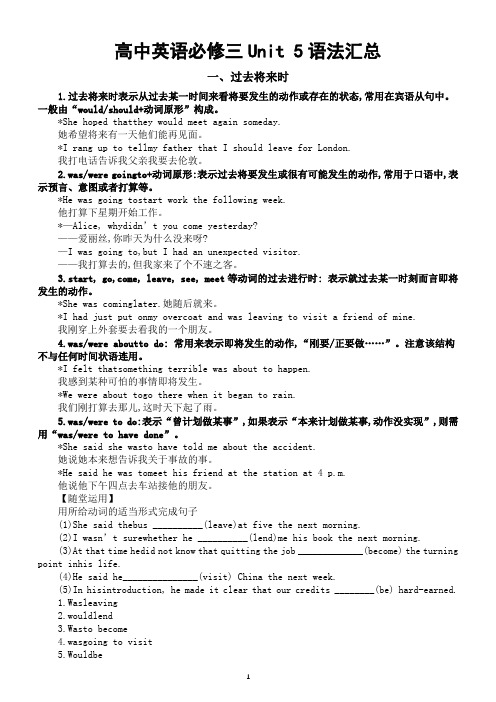
高中英语必修三Unit 5语法汇总一、过去将来时1.过去将来时表示从过去某一时间来看将要发生的动作或存在的状态,常用在宾语从句中。
一般由“would/should+动词原形”构成。
*She hoped thatthey would meet again someday.她希望将来有一天他们能再见面。
*I rang up to tellmy father that I should leave for London.我打电话告诉我父亲我要去伦敦。
2.was/were goingto+动词原形:表示过去将要发生或很有可能发生的动作,常用于口语中,表示预言、意图或者打算等。
*He was going tostart work the following week.他打算下星期开始工作。
*—Alice, whydidn’t you come yesterday?——爱丽丝,你昨天为什么没来呀?—I was going to,but I had an unexpected visitor.——我打算去的,但我家来了个不速之客。
3.start, go,come, leave, see, meet等动词的过去进行时: 表示就过去某一时刻而言即将发生的动作。
*She was cominglater.她随后就来。
*I had just put onmy overcoat and was leaving to visit a friend of mine.我刚穿上外套要去看我的一个朋友。
4.was/were aboutto do: 常用来表示即将发生的动作,“刚要/正要做……”。
注意该结构不与任何时间状语连用。
*I felt thatsomething terrible was about to happen.我感到某种可怕的事情即将发生。
*We were about togo there when it began to rain.我们刚打算去那儿,这时天下起了雨。
人教版初二上册英语第五单元unit 5语法篇
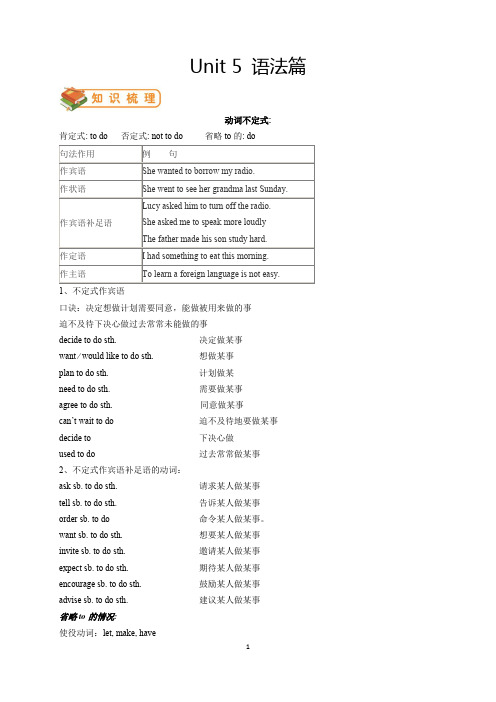
Unit 5 语法篇动词不定式:肯定式: to do 否定式: not to do 省略to的: do1、不定式作宾语口诀:决定想做计划需要同意,能做被用来做的事迫不及待下决心做过去常常未能做的事decide to do sth. 决定做某事want ∕ would like to do sth. 想做某事plan to do sth. 计划做某need to do sth. 需要做某事agree to do sth. 同意做某事can’t wait to do 迫不及待地要做某事decide to 下决心做used to do 过去常常做某事2、不定式作宾语补足语的动词:ask sb. to do sth. 请求某人做某事tell sb. to do sth. 告诉某人做某事order sb. to do 命令某人做某事。
want sb. to do sth. 想要某人做某事invite sb. to do sth. 邀请某人做某事expect sb. to do sth. 期待某人做某事encourage sb. to do sth. 鼓励某人做某事advise sb. to do sth. 建议某人做某事省略to的情况:使役动词:let, make, have感官动词:feel, hear, listen to, look at, see, watch, notice3、动词不定式做主语动词不定式作主语用的动词不定式常常为it替代,动词不定式(或短语)放在后面。
例如:It is not easy to learn a foreign language.It took us three days to do the work.4、动词不定式和疑问词连用动词不定式可以和疑问词what ,which, how, where, when 等连用,构成不定式短语。
如:I don’t know where to go.He showed me how to use a computer.What to do is a big problem.一、请找出下列动词中以动词不定式为宾语的动词并圈出来。
冀教版英语八年级下册Unit 5第五单元Unit 5 语法专题

典例 —Excuse me. Do you know ___C____? —Sorry, I don’t know, either. [龙东] A. when will the examination begin B. how can I get to the airport C. what’s wrong with the mobile phone
C.当宾语从句表示的是一个客观真理或者事实时,不 管主句是什么时态,从句都用一般现在时。 eg:(烟台中考)Yesterday the teacher told us the earth
goes around the sun. 昨天老师告诉我们地球围绕太阳转。 考向三 当从句的原句为以下句子以及what, who作主语 时,语序不变: What’s wrong? What’s the matter? What’s happening? eg:Can you tell me who is over there?
—It will be sunny.
[青岛]
A. what will the weather be like
B. what the weather will be like
C. when will the weather be sunny
D. when the weather will be sunny
【XXX】考查宾语从句的语序。句意:——打扰一 下,你知道_______ 吗?——对不起,我也不知道。 宾语从句要用陈述语序。
考向四【易错点】当主句的谓语动词是think, believe 等动词,且主语是第一人称时,宾语从句的 否定要放在主句中。 eg:I don’t think he looks like his father. 我认为他长得不像他爸爸。
九年级英语全一册语法总结(Unit5)

第五单元的语法重点是:一般现在式的被动语态;现在完成时;名词所有格。
一般现在式的被动语态英语中有两种语态:主动语态和被动语态。
主动语态表示主语是动作的执行者。
被动语态表示主语是动作的承受者。
(1) 一般现在时的被动语态表示现阶段经常性、习惯性的被动动作,由“主语+ am/is/are +及物动词的过去分词(+by+动作执行者)”构成。
例如:The yard is cleaned (by someone) every morning.院子每天早上都有人打扫。
(2)当我们不知道谁是动作的执行者,或不用指出动作的执行者,而需要强调动作的承受者时,就要用被动语态。
例如:Mobile phones are mainly used to keep in touch with other people.手机主要被用来和其他人保持联系。
(3) 一般现在时的被动语态的一般疑问句是将be提至句首; 否定句是在be后加noto例如:Is Chinese spoken by many people?许多人说汉语吗?The little girl is not looked after by her mother.这个小女孩不是由她的妈妈照顾。
(4)主动句变被动句将主动句的宾语变为被动句的主语,将主动句的谓语变为被动结构(be+过去分词),将主动句的主语放在介词by之后作宾语,若为主格应改为宾格。
例如:He broke the cup.他打破了杯子。
f The cup was broken by him.杯子被他打破了。
直击中考1.【广西南宁】32. Han Han's books are popular. They by many teenagers.A. is readB. was readC. are readD. were read2.【湖北宜昌】34.-At present, one of the best ways to study is working in groups. -More chances to students to learn from each other.A. offerB. are offeredC. have offeredD. are offering现在完成时(1)由have/has+过去分词(2)表示过去发生或已经完成的某一动作对现在造成的影响或结果, 常与already, just, yet, ever, never 连用。
八年级上册Unit5语法知识点

八年级上册Unit5语法知识点Unit 5是英语八年级上册学习的一个重要单元,其中语法知识点是重中之重。
本文将为大家详细讲解Unit 5中的核心语法知识点,希望对大家的学习有所帮助。
一、动词的时态动词的时态是八年级上语法中非常关键的一个知识点。
英语中动词的时态包括现在时、过去时和将来时。
现在时又包括一般现在时、现在进行时和现在完成时。
1.一般现在时一般现在时表示的是习惯性、经常性的动作或状态。
一般现在时的构成为:主语+动词原形(第三人称单数要加-s)。
例如:She often goes to the gym after work.2.现在进行时现在进行时表示的是正在进行的动作。
现在进行时的构成为:主语+be动词+动词ing。
例如:I am watching TV now.3.现在完成时现在完成时表示的是过去发生的动作对现在的影响或结果。
现在完成时的构成为:主语+have/has+过去分词。
例如:She has finished her homework.4.过去时过去时表示的是已经发生过的动作。
过去时的构成为:主语+动词过去式。
例如:We went to the park yesterday.5.将来时将来时表示的是将要发生的动作。
将来时的构成为:主语+will+动词原形。
例如:I will study hard for the test tomorrow.二、被动语态被动语态在英语语法中也是一个非常重要的知识点。
被动语态的构成为:be动词+过去分词。
被动语态的使用需要注意下面几点:1.主语是动作的承受者,谓语是做动作的人或事物。
2.一些动词不常用被动语态,如:believe、like、want、know 等。
3.有些动词本身就是不及物动词,不能使用被动语态。
例如:The book was written by him.(这本书是他写的。
)三、直接引语和间接引语直接引语是指直接引用他人的话。
例如:He said, “I’m verytired today.”间接引语则是将他人的话转述过来。
Unit5知识点语法人教版八年级英语上册

姓名_______________ 上课时间__________________Unit 5 语法:动词不定式动词不定式作宾语1.构成基本形式:to+动词原形;有时可以不用to,to是不定式符号,本身无词义。
否定形式:not+(+to)动词原形2.句法功能:不定式可以作主语,表语,宾语,宾补,定语,状语,也就是除谓语动词之外的任何成分。
3.本单元重点是不定式宾语。
(1)只能接to do作宾语的动词:三个希望两答应:hope,wish,want,agree,promise。
两个要求莫拒绝:demand,ask,refuse。
设法学会做决定:manage,learn,decide。
不要假装做选择:pretend,choose。
还有would like,like,plan,expect等表示命令、打算或希望的。
(2)在find,think等后跟不定式作宾语时,常用it代替,而真正的宾语放在后面。
I find it easy to read English every day。
(3)常见的一些不带to的不定式:Why not do…,why don’t you do…,had better(not)do…,would rather do…,could/would/will you please(not)…。
I would rather stay at home。
(4)只能作某些动词的宾语,不能作介词的宾语。
(5)不定式常和疑问词what,which,when,where,how连用,相当于一个宾语从句。
He didn’t know where to go。
(6)有些动词后面跟动词不定式时,应将不定式符号to省去。
常见的动词有let,make,feel,help,watch,hear等感官动词和使役动词。
这是动词不定式作宾补。
一感(feel)、二听(hear,listen to)、三让(let,make,have)、四看(look at,see,watch,notice)。
- 1、下载文档前请自行甄别文档内容的完整性,平台不提供额外的编辑、内容补充、找答案等附加服务。
- 2、"仅部分预览"的文档,不可在线预览部分如存在完整性等问题,可反馈申请退款(可完整预览的文档不适用该条件!)。
- 3、如文档侵犯您的权益,请联系客服反馈,我们会尽快为您处理(人工客服工作时间:9:00-18:30)。
unit 5语法(单元5语法)unit 5语法1.linking verb + the系动词+形容词,构成系表结构.系动词:we 11 (是)feel look sound taste turn get become smell seem等等.for example: the food tastes delious・2.hope与wish的比较•都与that引导的从句连用・hope常用于将来时表可能实现的愿望・wish常用于过去式表示不可能实现的愿望.for example: i hope that you will be happy.i wish that you could be happy.3.动词- ing和- ed形式作主语补语的区别•动词- ing表示主语的特征,常用于事物•动词- ed表示主语的状态,常用于人•这类词有:interest move active disappoint excite surprise frighten bore 等等.for example: the game is interesting・i am interested in the game・4.表示能力的词.could表示过去的能力.can表示现在的能力be able to表示过去,现在,将来任何时候的能力•将来吋态(e \ will be able to --------- )5.原因状语从句.引导词:because since i know等,但是因为,所以不能同时出现.for example: he is ill, i know he isn,t able to come・she is lonely because she has no friends to talk with・ since she is very strict with herself, she is unhappy・6.always常用于一般现在吋•表示频繁发生的动作•但与现在进行时态连用表是厌恶,责备,赞扬的语气.for example: she is always talking about money.7.can,t 表示一种否定的推测.you can,t have sars.must 表示一种肯定的推测.it must be sunny day tomorrow8.使役动词(让----- \使------ )make let have的用法.make +宾语+ (省约to的不定式)动词.make +宾语+名词. we make him team leader・make + 宾语 + 形容词.it make me happy・ let +宾语+ (省约to的不定式)动词.have +宾语+ (省约to的不定式)动词老师叫john到办公室拿他的书.the teather made (had) john get his book in the office・爸爸让我明天下午看电视.father let me watch tv tomorrow afternoon・9.英语语法as. . . as> so... as> so... that 和too... to 的用法区别%1so. . . as只用于否定句,as... as不但可用于肯定句,还可用于否定句%1as. . . as中的第一个as是副词,后接形容词或副词的原形;笫二个as是连词,引导比较状语从句.例如:jack is as tall as you.杰克和你一样高.jim is not so / as good as you.吉姆不如你聪明.%1so that如此・・・以至于(只能引导结果状语从句,的后面多接形容词、副词或分词,后接句子.例如:the house was so crowded that i could hardly turned around・屋里很挤,我几乎都无法转身了.%1too d太・・・以至于不能・・・(too为副词,后接形容词或者副词,to为不定式的标志,这个不定式短语本身带有否定含义・)例如:the box is too heavy for her to carry it.对于她来说,这个箱子太重了.She can,t carry it10.few; a few; little; a; little usage and difference1 (a) and few (a) little differenceFrom the modified noun: (a) few, followed by countable nouns, andin the plural; (a) little followed by uncountable nouns・ Such as:We, had, little, time, to, do, it., we don,t have much time to do it.There,s only, a, little, soup, left・,there J s only a little soup left.He has few friends・ he has few friends・r 11 only be away a few minutes・,I'm only a few minutes away.From the point of view: above mentioned, both can indicate quantity, the main difference is, (a) few followed by countable nouns, (a) little, followed by uncountable nouns・ However, (a) little canalso indicate size・ Such as:Please, accept, this, little, gift・,please accept this little gift.There, are, several, little, towns, along, the, river・,how many towns are there along the river?・Note the following two sentences・ The little in front indicatesthe shape or stature, and the little in the back indicates the quantity is small":The little boy is very busy. He has little time to play. the little boy is very busy and he has little time to play.It's a little anima 1. It eats only a little food・ that is a small animal, it only eats a little bit of food・From their point of view: in the part of speech POS, both have in common is that can be used as an adjective or a pronoun: the difference is that little (a) is used as an adverb, is used to modify adjectives, adverbs, verbs and prepositional phrases・ Such as:He, is, a, little, tiredhe's a little tired・They, are, a, little, bit, better, now., now they are a little better・You, should, walk, a, little, faster・,you should walk a little faster・She was only a little over fifty years old・ she Wushiduoyi point. The A and a have no differenceWithout a, little and few contain negative meaning, which meansthat the quantity is small or almost no, and emphasizes "less"; "little" and 〃few〃with contain positive meaning, which means that the quantity is less, but after all, there is emphasis on 〃yes〃〃・Compare:Few people like such things・ nobody likes that kind of thing・A, few, people, like, such, things・,a few people like that・He knows little English・ he hardly knows english・He, knows, a, little, English・,he knows a little english・Note that when few does not have a before, but with the, some, these, those and other modifiers, it also means positive・ Such as:Some, few, have, already, left・,a few have already left・The last, few, winters, have, cold・,been, very, the past few winters have been very cold・The first, few, chapters, are, about, , his, early, days・,thefirst few chapters about his boyhood・The development of thinkingPay attenti on to the use and distinction of the comp ar a tive and superlative levels: the comparative and superlative levels oflittle are less and least, and the comparative and superlative levels of few are fewer and fewest respectively. Such as:Boys, think, less, about,, dress, than, girls, do. boys don,t dress like girls・He, has, the, least, money, of, all, of, us. , he is the leastexpensive of all of us.Fewer radios were sold this year than last・ has sold fewer radios this year than last year・He, tried, to, finish, the, work, with, least, money, , and, fewest, people・He tried to finish the work with the least amount of money and the least amount of people・The use of 11. - link verbsLinking verb itself has a certain meaning, but not independent as predicate, and predicate predicative must be together・ It usually consists of nouns, adjectives, or equivalent noun or adjective words or phrases such as, that what the subject is or how.Two, classification1."existence" class: indicating existence or having a certain characteristic or state・ Such linking verbs emphasizeexistenee". Common are: be (yes), look (looks), feel (touch), seem (seems to), appear (appear, appear), prove (prove), smell (smell), taste (taste), sound (sounds), etc•・ Such as:The story sounds true・Those oranges taste good.2.〃susta in ability77: the continuity of a situation or state. These verbs emphasize "continuous"〃・Common include: remain (still), keep (hold), stay (hold), continue (continue, still), stand (in a situation or situation), etc・・ Such as:Why, don't, you, put, the, in, the, fridge, meat, It, will, stay, fresh,, for, several, days・It's, already, ten, in, the, morning・,The, store, remains,, closed・,What's, the, matter?3."change" class: change from one situation or state to another. This type of linking verb emphasizes the situation or condition after change・ Common features are: become (becoming), turn (becoming), grow (becoming), go (becoming), etc・・ Such as:Put, the, fish, in, the, fridge, or, it, will, go, bad,, in, hot, weather・Three, matters needing attention1.some linking verbs are not usually used in the passive voice and in the progressive tense・ Such as: feel, taste and so on.Such as:-Do, you, like, the, material?-Yes, it, feels, very, soft・2.in general, mainly with the linking verb adjective orparticiples as predicative・ Such as:Be, careful, when, you, cross, very, busy, street・,If, not, you, may, get,, run, over, by, this, a, car.3.as a predicative copular verb noun with common are: be, become, appear, seem, prove, remain and turn・(Note: turn followed by said the identity of the subject noun predicative), without・ Such as:Twenty, years, later, he, turned, teacher・The, population, growth, in, China, remains, a, problem・4.linking verbs can also follow the infinitive (to do / to be), common are: appear, seem, remain, prove, look, and so on. Such as:Having, a, trip, abroad, is, good, for, the, old, couple, but, it, remains, to, be, certainly, seen, whether,, they, will, enjoy, it.On, the, long, journey, Peter, proved, to, be, a, most, interesting, guide・,We,, all, had, time・,a, wonderful。
